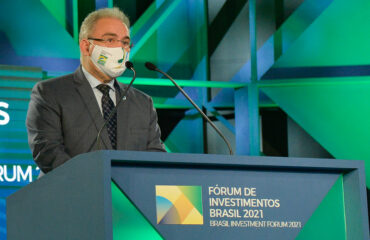
During the fifth panel of the Brasil Investment Forum (BIF) 2021, specialists presented the opportunities and the current Brazilian scenario for investments in infrastructure,
a sector that has a wide room for expansion
Infrastructure is a key factor for Brazil’s socioeconomic development. And the sector was the specific theme of the fifth panel of the Brasil Investment Forum 2021, the largest event for investment attraction in Latin America. The idea was to discuss opportunities for investors, even in a pandemic context. This is because, even in atypical times, due to the Covid-19 pandemic, investment possibilities in Brazil keep emerging. This is due, particularly, to the strengthening of the economy in recent years and the recent actions taken by the Brazilian government.
So far, the Council of the Ministry of Economy’s Investment Partnerships Program (PPI) has delivered more than 200 projects with a wide variety of assets, with an estimated investment of US$ 132 billion. For 2021, 129 assets are expected to be presented to the private sector, with estimated investments of more than US$ 76 billion.
The Brazilian Government’s privatization agenda, added to the set of activities related to infrastructure, has great room for expansion – capable of directly impacting the Brazilian productive chain. The subject was promoted by the Brazilian Trade and Investment Promotion Agency (Apex-Brasil), the Inter-American Development Bank (IDB) and the Brazilian Government, organizers of the Brasil Investment Forum (BIF). This is the fourth edition of the event and the first one that was held entirely online.
Infrastructure as a ground for investment
Infrastructure involves segments such as railroads, highways, ports, airports, sanitation, and telecommunications, among others. In the panel “Infrastructure: Sector and regional opportunities for foreign investment”, the specialists indicated how the sector is fertile ground for new opportunities for the country. “We have a protagonist role in what we call investments in governance, sustainability and clean energy”, pointed out the panel’s moderator and Secretary of Development, Planning and Partnerships of the Ministry of Infrastructure, Natália Marcassa.
The Minister of Communications, Fabio Faria, pointed out that Brazil has wide opportunities for investments in the sector. “We have an audience, a high-level audience. It is interesting for our infrastructure. We never stop working hard to deliver privatizations and concessions, to keep the economy sustainable and attractive for the private sector”.
Faria also pointed out that the portfolio is working to solve the connectivity offer to the population, highlighting 5G. “It is a challenge to fill the communication gap, while 5G is emerging. 4G was fundamental, but 5G is designed for the industry, to connect the supply chain and increase productivity,” he explained, adding that a total change in Brazil’s communications system was foreseen. “We will have the benefit of a new regulatory environment, making everything more predictable and with legal security,” concluded the minister.
The Special Secretary of the Investment Partnerships Program (PPI), Martha Seillier, addressed the importance of destatization and privatizations. “The PPI is a federal program that facilitates the coming of private investments essentially for infrastructure, but also in the sense of a greater opening of markets and an important agenda of privatizations of companies, which is this important work of destatization, which is intertwined with the PPI”.
According to Seillier, Brazil maintains intense and daily dialogue with investors who are in the country and intend to invest here. “We can proudly say that Brazil today has probably the largest number of assets to be offered to the private sector, in the most different sectors, such as road concessions, railway projects, airports, energy projects, auctions in the mining sector, PPPs for daycare centers, hospitals, public lighting, prisons, and telecommunications, such as the 5G auction,” he pointed out..
For IDB Invest CEO James Scriven, reforms are necessary for industrial growth. “For industry to grow, reforms are needed to address global changes and create a more inclusive economy. For Brazil, its location is competitive and there is great potential for investment in infrastructure,” said Scriven.
Investments in infrastructure are the basis for a future of development in the country. On this, the Vice President of the Private Sector of the Development Bank of Latin America (CAF), Jorge Arbache, pointed out: “The future in the 21st century is extremely challenging, because technologies and innovations have been assuming an extremely determining condition for the productivity and competitiveness of companies and countries. And one of them is the digital economy: it is absolutely central, whether as an input for household consumption, or as a critical and vital instrument for value chains, to enable productivity and competitiveness”.
About BIF
The second day of the Brasil Investment Forum (BIF) 2021 offered four panels with qualified debates on strategic issues for the country. In addition to infrastructure, tables were held on innovation, agribusiness and the regulatory agenda. To follow the publications related to BIF, access the website www.brasilinvestmentforum.com.



